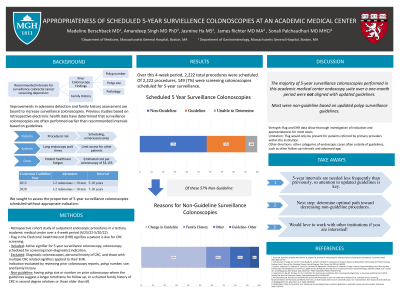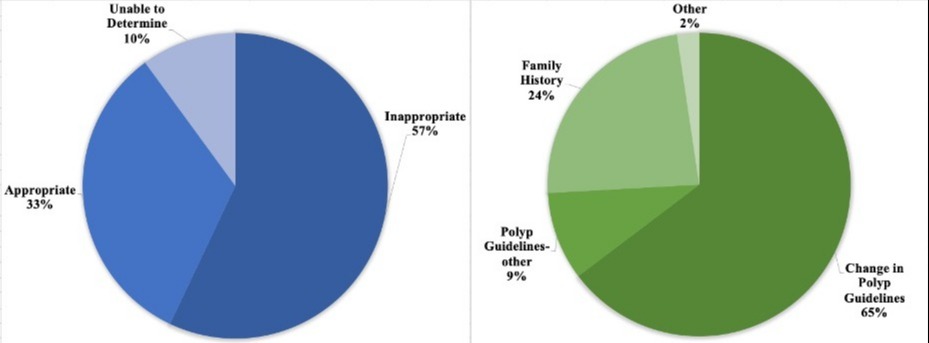Back


Poster Session B - Monday Morning
Category: Colorectal Cancer Prevention
B0180 - Appropriateness of Scheduled 5-Year Colorectal Cancer Surveillance Colonoscopies at an Academic Medical Center
Monday, October 24, 2022
10:00 AM – 12:00 PM ET
Location: Crown Ballroom

Has Audio
- MB
Madeline Berschback, MD
Massachusetts General Hospital
Boston, MA
Presenting Author(s)
Madeline Berschback, MD, Jasmine Ha, MS, James Richter, MD, Sonali Palchaudhuri, MD, MHCI
Massachusetts General Hospital, Boston, MA
Introduction: Prudent adenoma detection and family history assessment results in increased surveillance colonoscopies for colorectal cancer screening (CRC), where recommended intervals for follow-up colonoscopies are based on prior colonoscopy findings (i.e., polyp number, size, pathology) as well as family history. Previous studies based on retrospective electronic health data determined that surveillance colonoscopies are often performed earlier than recommended intervals based on guidelines. These procedures expose patients to procedural risks, inconvenience with scheduling and unnecessary preps, and add to healthcare costs, as well as increase caseload for endoscopy centers that often have limited capacity. In the context of updated surveillance guidelines that lengthen follow-up intervals for some adenomas, we sought to assess the proportion of 5-year surveillance colonoscopies scheduled without appropriate indication.
Methods: We conducted a retrospective cohort study of all outpatient endoscopic procedures scheduled in a tertiary, academic medical center over a 4-week period (4/25/22-5/20/22). We screened for cases that had an active Electronic Health Record (EHR) flag for 5-year screening colonoscopy and were classified by the ordering provider as having a screening, non-diagnostic indication, and then confirmed the EHR flag and indication with chart review. Two physicians conducted chart review of last colonoscopy and ordering provider documentation to evaluate indication and appropriateness for 5-year screening based on US Multi-Society Task Force February 2020 guidelines.
Results: The 4-week period included 2,222 total procedures scheduled, of which 149 were colonoscopies scheduled for 5-year surveillance. Of these, 57% (85/149) were inappropriate based on current guidelines, which accounts for 4% (85/2,222) of total cases. 74% (63/85) of inappropriate cases were due to not meeting polyp-based guidelines, where 65% (55/85) was due to the 2020 change in guidelines. 24% (20/85) were based on inappropriately applied family history.
Discussion: A majority of cases scheduled for 5-year surveillance were not indicated, where most were inappropriate based on updated polyp-based guidelines. Interventions targeting these cases and assessing overall appropriateness of cases may reduce patient harm and increase the capacity for necessary procedures.

Disclosures:
Madeline Berschback, MD, Jasmine Ha, MS, James Richter, MD, Sonali Palchaudhuri, MD, MHCI. B0180 - Appropriateness of Scheduled 5-Year Colorectal Cancer Surveillance Colonoscopies at an Academic Medical Center, ACG 2022 Annual Scientific Meeting Abstracts. Charlotte, NC: American College of Gastroenterology.
Massachusetts General Hospital, Boston, MA
Introduction: Prudent adenoma detection and family history assessment results in increased surveillance colonoscopies for colorectal cancer screening (CRC), where recommended intervals for follow-up colonoscopies are based on prior colonoscopy findings (i.e., polyp number, size, pathology) as well as family history. Previous studies based on retrospective electronic health data determined that surveillance colonoscopies are often performed earlier than recommended intervals based on guidelines. These procedures expose patients to procedural risks, inconvenience with scheduling and unnecessary preps, and add to healthcare costs, as well as increase caseload for endoscopy centers that often have limited capacity. In the context of updated surveillance guidelines that lengthen follow-up intervals for some adenomas, we sought to assess the proportion of 5-year surveillance colonoscopies scheduled without appropriate indication.
Methods: We conducted a retrospective cohort study of all outpatient endoscopic procedures scheduled in a tertiary, academic medical center over a 4-week period (4/25/22-5/20/22). We screened for cases that had an active Electronic Health Record (EHR) flag for 5-year screening colonoscopy and were classified by the ordering provider as having a screening, non-diagnostic indication, and then confirmed the EHR flag and indication with chart review. Two physicians conducted chart review of last colonoscopy and ordering provider documentation to evaluate indication and appropriateness for 5-year screening based on US Multi-Society Task Force February 2020 guidelines.
Results: The 4-week period included 2,222 total procedures scheduled, of which 149 were colonoscopies scheduled for 5-year surveillance. Of these, 57% (85/149) were inappropriate based on current guidelines, which accounts for 4% (85/2,222) of total cases. 74% (63/85) of inappropriate cases were due to not meeting polyp-based guidelines, where 65% (55/85) was due to the 2020 change in guidelines. 24% (20/85) were based on inappropriately applied family history.
Discussion: A majority of cases scheduled for 5-year surveillance were not indicated, where most were inappropriate based on updated polyp-based guidelines. Interventions targeting these cases and assessing overall appropriateness of cases may reduce patient harm and increase the capacity for necessary procedures.

Figure: Figure 1a: Appropriateness of Scheduled 5-Year Surveillance Colonoscopies
Figure 1b: Reasons for Inappropriate Colonoscopy Scheduling
Figure 1b: Reasons for Inappropriate Colonoscopy Scheduling
Disclosures:
Madeline Berschback indicated no relevant financial relationships.
Jasmine Ha indicated no relevant financial relationships.
James Richter indicated no relevant financial relationships.
Sonali Palchaudhuri indicated no relevant financial relationships.
Madeline Berschback, MD, Jasmine Ha, MS, James Richter, MD, Sonali Palchaudhuri, MD, MHCI. B0180 - Appropriateness of Scheduled 5-Year Colorectal Cancer Surveillance Colonoscopies at an Academic Medical Center, ACG 2022 Annual Scientific Meeting Abstracts. Charlotte, NC: American College of Gastroenterology.

